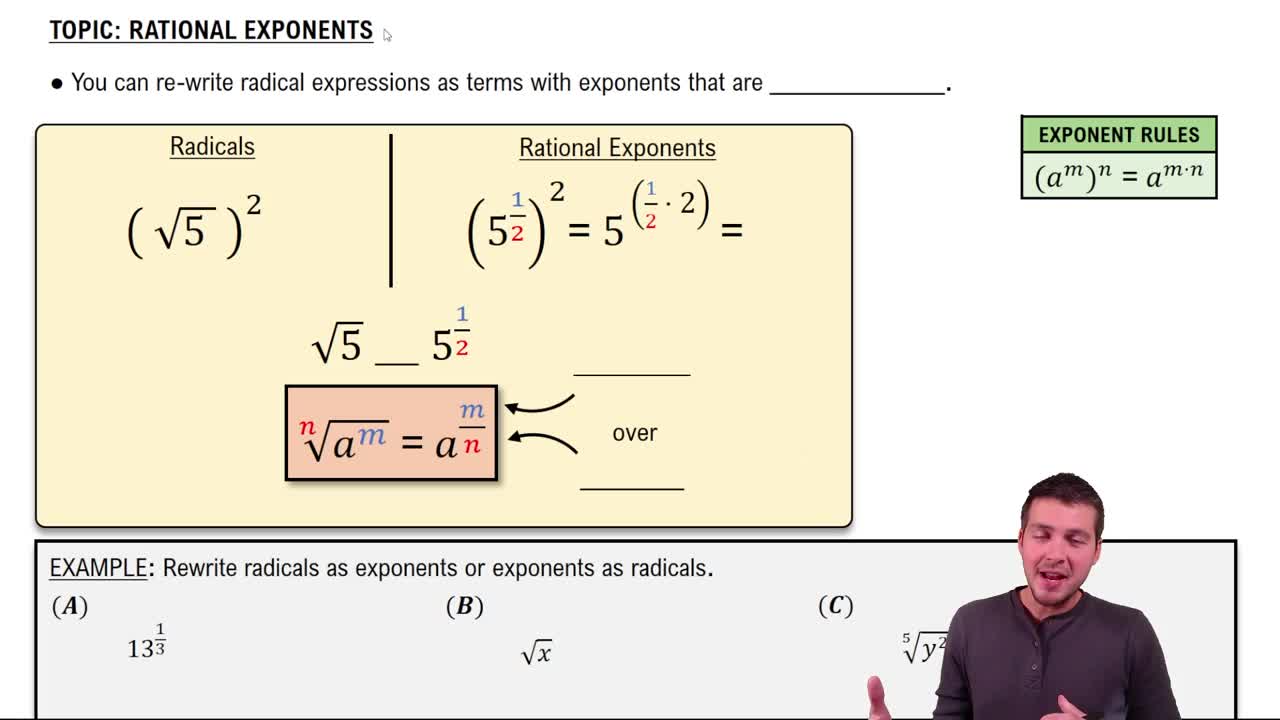Factor by any method. See Examples 1–7.
Table of contents
- 0. Review of Algebra4h 18m
- 1. Equations & Inequalities3h 18m
- 2. Graphs of Equations1h 43m
- 3. Functions2h 17m
- 4. Polynomial Functions1h 44m
- 5. Rational Functions1h 23m
- 6. Exponential & Logarithmic Functions2h 28m
- 7. Systems of Equations & Matrices4h 5m
- 8. Conic Sections2h 23m
- 9. Sequences, Series, & Induction1h 22m
- 10. Combinatorics & Probability1h 45m
0. Review of Algebra
Factoring Polynomials
Problem 122
Textbook Question
Factor out the least power of the variable or variable expression. Assume all variables represent positive real numbers. See Example 8. 6r-2/3-5r-5/3
 Verified step by step guidance
Verified step by step guidance1
Identify the terms in the expression: \$6r^{-\frac{2}{3}} - 5r^{-\frac{5}{3}}$.
Determine the powers of \(r\) in each term: the first term has \(r^{-\frac{2}{3}}\) and the second term has \(r^{-\frac{5}{3}}\).
Find the least power (smallest exponent) of \(r\) between \(-\frac{2}{3}\) and \(-\frac{5}{3}\). Since \(-\frac{5}{3} < -\frac{2}{3}\), the least power is \(r^{-\frac{5}{3}}\).
Factor out \(r^{-\frac{5}{3}}\) from each term: write each term as a product involving \(r^{-\frac{5}{3}}\). For the first term, express \(r^{-\frac{2}{3}}\) as \(r^{-\frac{5}{3}} \times r^{\left(-\frac{2}{3} + \frac{5}{3}\right)}\).
Rewrite the expression as \(r^{-\frac{5}{3}}\) times the simplified terms inside parentheses, and simplify the exponents inside the parentheses to complete the factoring.
 Verified video answer for a similar problem:
Verified video answer for a similar problem:This video solution was recommended by our tutors as helpful for the problem above
Video duration:
3mPlay a video:
Key Concepts
Here are the essential concepts you must grasp in order to answer the question correctly.
Negative Exponents
Negative exponents indicate the reciprocal of the base raised to the positive exponent. For example, r^(-2/3) means 1 divided by r^(2/3). Understanding this helps in rewriting expressions to factor or simplify them correctly.
Recommended video:
Guided course

Zero and Negative Rules
Factoring Out the Least Power
Factoring out the least power involves identifying the smallest exponent of the variable in all terms and factoring it out as a common factor. This simplifies the expression by reducing the powers inside the parentheses.
Recommended video:

Powers of i
Properties of Exponents
Properties of exponents, such as a^m / a^n = a^(m-n), allow manipulation of terms with exponents during factoring. These rules are essential for combining, dividing, or factoring expressions involving variables with fractional or negative exponents.
Recommended video:
Guided course

Rational Exponents

 7:30m
7:30mWatch next
Master Introduction to Factoring Polynomials with a bite sized video explanation from Patrick
Start learningRelated Videos
Related Practice
Textbook Question
856
views
